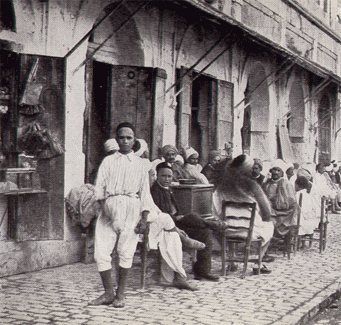
The Café in the Place Halfaouine.
In an earlier post I provided the Orientalist musings of Ms. Norma Octavia Lorimer, whose By the Waters of Carthage (1925) is classic put-down travel mongrelism. If you thought the first part was bad, read on below…
“OH, MY DEAR!
Come and take me to the desert; it lies over there, in the great Beyond, like Death — waiting — waiting — waiting.
I have seen camels in their proper atmosphere, lading their common everyday life of indifference, though so far, I must admit, I have not seen them trying to get through the eye of a needle. These strange supercilious leavings of the prehistoric past are almost as scornful of mankind as new-born babies. A Horse looks as foolishly modern besides a camel as an Englishman in his blue serge suit looks beside a burnoused and biblical Moslem…
I have been in the souks (bazaars), and it is true that there above all places you can hear the East ‘a-calling’; it is there that you forget that Tunis is under French protection and it has fine boulevards and theatres and a Petit Lourve, for all that is on the other side of the horseshoe gate (the porte de France, as it is called), and my hotel is within in. It is in the bazaars before midday that you get a glimpse of how the people live, for the pulse of the city is there, if an Arab city has a pulse. The thing that strikes one most about these delicate-featured Moors and Arabs is their total indifference to everything except how they look; that they do care about, for they are one and all dressed like the resplendent heroes in The Arabian Nights. My first impression of them is that they seem to sleep a great deal (rolled up like fat pigs in white burnouses on the small floors of their cupboard-like shops), smoke a great deal, pray a great deal, eat very little, and leave Allah to do the rest. Their trust in Allah is profound, and their indifference to Time superb…
What a man’s world a Moslem city is! Except for those grosses juives and a stray Bedouin or two, you scarcely ever see, in the native quarters, a female thing — even a girl baby. Now and then an elderly Arab woman of the humble class crosses the square. She might be a creature of any sex or age, for she is nothing but a shapeless bundle of white with a piece of black crêpe where her face ought to be. She is veiled so closely — even though she is certain to be elderly and ugly, otherwise she would not be allowed out — that she can only see the ground in front of her feet; yet if a man passes close to her she will hold a coloured handkerchief over her dark eyes, which are the only part of her not completely disguised by clothes. These black masks, or ‘haiks,’ as they are called, are said to be made of plaited horsehair, but they look to me like crêpe. Such a complete disguise as this for an everyday costume ought t be rather helpful in the case of a romance or intrigue, for all women look exactly alike. A man might easily pass his own wife without suspecting who she was if she held her handkerchief before her eyes, but few men would be brave enough to follow an Arab woman or to gaze into her gleaming eyes, for the Tunisian Arabs have always been extraordinarily fanatical about their women and their religion. yet the Orient, with all this charm of mystery, does not seem to me the least romantic…
The subject of sex in the East is so painfully accentuated that all which is feminine in Tunis makes me feel ashamed of being a woman…
P.S. – I have at last found out why an Arab always leaves a little tuft of hair on the top of his shaven head. It is for the lifting of him up to heaven. The Prophet considered the shaving of heads an unnecessary luxury, and although he did not denounce the popular custom altogether, he limited it to those who wear turbans, appeasing his conscience with the fact that to wear a turban and hair in a very hot climate is injurious to health. By what shall a Christian be lifted up to heaven? By the tails of his dress-coat, think you, or by his banking-account?â€
[Excerpt from Norma Octavia Lorimer, By the Waters of Carthage (New York: Frederick A. Stokes Company, 1925), pp. 10, 14-15.]